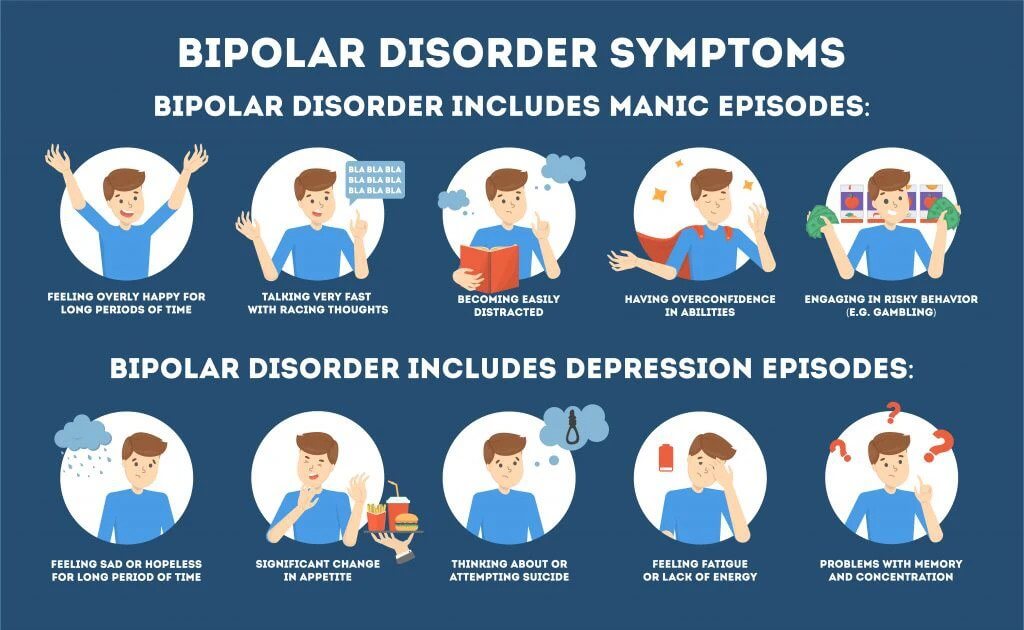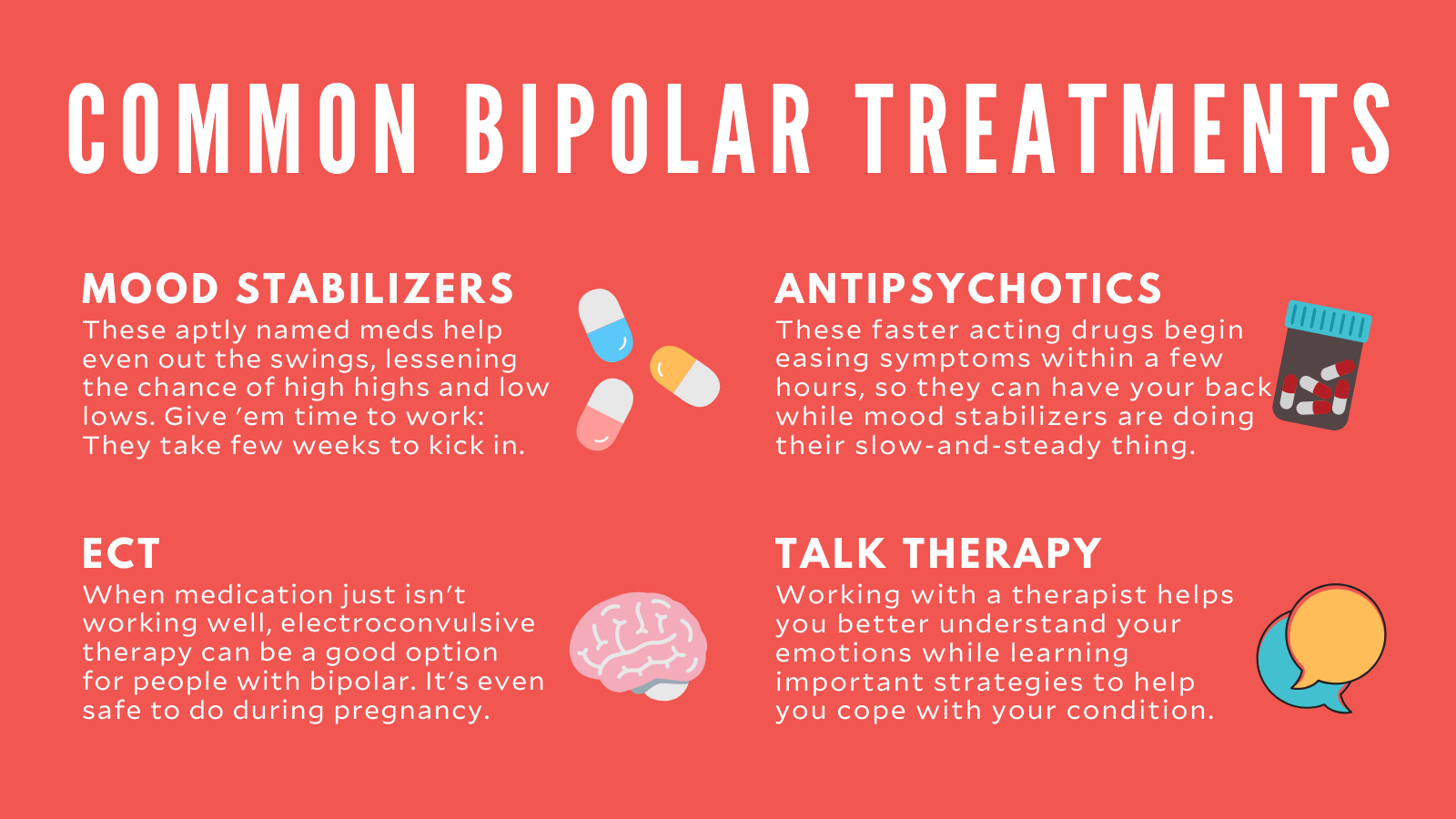What is Bipolar Disorder | Signs and Symptoms | Test and Treatment

We all get mood swings from time to time, right? But sometimes those mood swings could be a symptom of a psychological disorder. Bipolar disorder, not unheard of, can affect the day-to-day functions of a person. This can cause serious shifts in moods, thoughts, actions, and emotions in a person, disrupting their lives.
What Is Bipolar Disorder?
Bipolar disorder is a serious mental health problem that causes severe mood changes, ranging from ecstatic, and excited to sadness and hopelessness. The ‘up’ mood is known as a manic episode whereas the ‘down’ mood is known as a depressive episode. The fluctuations in a person’s mood can cause them to feel hyper-productive one moment and depressive the next.

Bipolar is a chronic illness and is usually diagnosed in teenagers and young adults. People with bipolar can further be diagnosed with ADHD, substance abuse, or anxiety disorders.
Signs And Symptoms of Bipolar Disorder
Bipolar symptoms can look different in every person. The symptoms can vary from pattern to frequency. There are only a handful of symptoms of bipolar. Mania, hypomania, and depression.

1. Mania
In a manic episode, a person either feels high euphoric emotions and is hyperactive filled with ecstatic energy, or can be irritable and reckless. Common signs of mania include:
- Exaggerated high emotions and energy
- Less sleepy
- Easily distracted
- Increase in reckless behavior
- Racing thoughts
Disclaimer: As BetterHelp Affiliate, We may receive compensation from BetterHelp or other sources if you purchase products or services through the links provided on this page.
2. Hypomania
Hypomania is a less acute form of mania. In a hypomanic episode, a person feels the same symptoms as in mania but less severe. A person can perform daily activities without much harm in a hypomanic state.
3. Depression
Symptoms of regular depression and bipolar depression are different. Regular antidepressants cannot help bipolar symptoms as effectively as it can its counterpart as they can make an episode worse – triggering mania or hypomania. Symptoms of bipolar depression may include:
- Feeling hopelessness, sad and void
- Irritability and psychotic depression
- Fatigue and loss of energy
- Appetite and change in weight
- Feelings of guilt
- Thoughts of suicide or self-harm
Tests For Bipolar Disorder:
There are three types of Bipolar disorder:
1. Bipolar I
Bipolar I is when a person feels mania or mixed episodes. In this phase, the manic episodes are clear. A person’s mood shifts and changes in activities are extreme.
2. Bipolar II
Bipolar II is when a person feels hypomania or depressive episodes. It is the most commonly diagnosed bipolar disorder. The symptoms of the second phase of bipolar disorder are mild and less severe than bipolar I.
3. Cyclothymia
Cyclothymia is when a person feels hypomania or mild depression. The symptoms of this phase are not severe and a person can function normally without any help of medication. Although, it can develop into bipolar I or II in time, if not treated early.
There are different tests to diagnose the stage of bipolar disorder. These tests can be done by:
- Physical exams and blood tests
- Mental health evaluation
- Keeping a journal to record the mood swings
Treatment For Bipolar Disorder:
Ignoring a situation doesn’t make it go away instead it can make a person’s condition worse.
Often, in pursuit of helping our loved ones, we reach out for an expert or professional assessment.
Bipolar can affect a person’s professional and personal lives if left untreated. We don’t want our loved ones to suffer and the need to help there is out there within your grasp. Although, treatment for bipolar is long term and requires more than medicinal help.

Image Source: HealthCentral
Treatments for bipolar can include:
1. Psychotherapy
Through psychotherapy, bipolar disorder can be treated effectively and efficiently. Cognitive behavioral therapy (CBT) and family-focused therapy can help a person manage stress, identify the beginning of an episode and the tools by which it can be managed, or undertake the help of family and loved ones to assist with the treatment. This treatment can improve the personal lives of the affected.
2. Lifestyle changes
Keeping a routine for eating well and sleeping can help with the erratic mood swings in a person with bipolar. Since social anxiety and panic attacks are common in a bipolar person, maintaining a consistent routine can help curb irregular episodes and anxiety attacks. Nature walks, home remedies to relieve stress are common methods that can be used to treat the psychological health issue.
3. Medication
As mentioned before, bipolar depression is way different than regular depression and may require different medical treatment than regular treatment. Recommended medication may include mood stabilizers and antipsychotics. Though, it is always best to ask a physician or professional mental health provider for appropriate medication.
If you or your loved one has signs or symptoms of bipolar, talk to a doctor and get a proper diagnosis. You may seek help from supportive communities. Talking with people with the disorder can help understand the perils of living with bipolar disorder.
You May Like These Also:
Best Online Bipolar Disorder Support Groups
List of Mental Disorders – All You Need To Know!
Famous People And Celebrities With Schizophrenia
Top 10 Movies About Psychological Disorders

“As BetterHelp Affiliate, we may receive compensation from BetterHelp or other sources if you purchase products or services through the links provided on this page.”






















One of my friend also facing such problem now i can suggest this article for reading hope after that he got any solution.